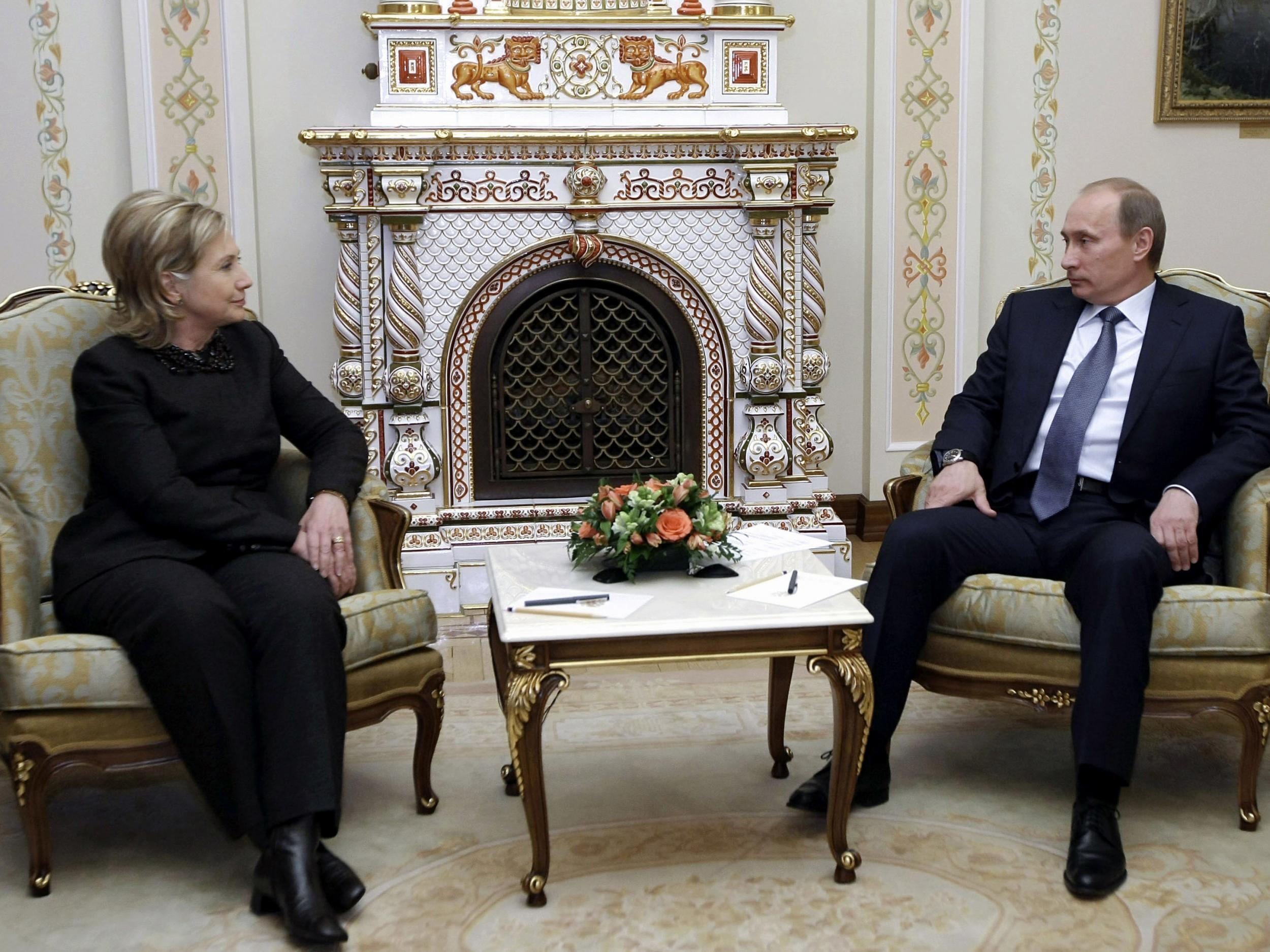US election 2016: The countries Hillary Clinton will have to build bridges with if she becomes president
She blames Putin for hack on DNC – and he returns feelings of animosity

Your support helps us to tell the story
From reproductive rights to climate change to Big Tech, The Independent is on the ground when the story is developing. Whether it's investigating the financials of Elon Musk's pro-Trump PAC or producing our latest documentary, 'The A Word', which shines a light on the American women fighting for reproductive rights, we know how important it is to parse out the facts from the messaging.
At such a critical moment in US history, we need reporters on the ground. Your donation allows us to keep sending journalists to speak to both sides of the story.
The Independent is trusted by Americans across the entire political spectrum. And unlike many other quality news outlets, we choose not to lock Americans out of our reporting and analysis with paywalls. We believe quality journalism should be available to everyone, paid for by those who can afford it.
Your support makes all the difference.From squabbles over who funds terrorists, to spats over rigging elections and stealing private documents, it is fair to say Hillary Clinton’s decades-long career has had some rough diplomatic patches.
Now, if she becomes US president, she is going to have to make amends. Here are just a few of the world powers Clinton would need to ease tensions with.
Qatar and Saudi Arabia
A tranche of emails released by WikiLeaks revealed the former Secretary of State accused Qatar and Saudi Arabia of giving money and logistical help to Isis, an accusation the countries staunchly deny.
In a 2014 email to her campaign chairman John Podesta she said: “We need to ... bring pressure on the governments of Qatar and Saudi Arabia, which are providing clandestine financial and logistic support to Isil [Isis] and other radical Sunni groups in the region.”
And in another recent release, which included an excerpt from a private 2013 speech, she said: “The Saudis have exported more extreme ideology than any other place on earth over the course of the last 30 years.”
Yet relations between Ms Clinton and the Gulf states are apparently not so sour that the Clinton foundation could refuse a $10m donation from the Saudi kingdom. Qatar has also donated between one million and five million to the organisation.
Nonetheless, when it comes to trade, geopolitical alliances and the ongoing Syrian crisis, Clinton will need the support of her Gulf allies like never before if she becomes president.
Russia
Animosity between Ms Clinton and the Russian leader Vladimir Putin was evident throughout the presidential campaign.
She has blamed Mr Putin directly for carrying out the hack against the Democratic National Committee (DNC) that led to the leak of a cache of emails that nearly derailed her presidential bid. “This has come from the highest levels of the Russian government, clearly, from Putin himself, in an effort ... to influence our election,” she said.
During the third and final presidential debate, she accused Donald Trump of acting as a puppet for Moscow.
And it seems the feelings of distain are mutual.
Mr Putin has blamed the democratic nominee for inciting mass-scale protests against him following the Russian election in 2011.
He said at the time: “The first thing that the Secretary of State did was say that they were not honest and not fair, but she had not even yet received the material from the observers.
“She set the tone for some actors in our country and gave them a signal. They heard the signal and with the support of the US State Department began active work.”
Ms Clinton’s claims that Russia’s election was rigged signalled a breakdown in the US strategy of the time, to “reset” relations with Moscow.
One Russian source has since said Mr Putin was personally offended by the comments, inferring the hack against the DNC was payback.
Iran
There are two key sources of tension between Ms Clinton and Iran. Firstly, as Secretary of State under President Obama, Ms Clinton helped set up international sanctions against Tehran whilst also pursuing a policy of actively isolating the country over its nuclear programme.
Secondly, her vocal support for Israel has been a source of consternation among the fierce enemies of America’s staunchest ally in the region.
Indeed, during a campaign speech in June this year, Ms Clinton vowed she would take military action against Iran over its weapons programme if necessary.
“We brought Iran to the table. We began talks. And eventually, we reached an agreement that should block every path for Iran to get a nuclear weapon,” she said.
“Now we must enforce that deal vigorously. And as I’ve said many times before, our approach must be ‘distrust and verify’. The world must understand that the United States will act decisively if necessary, including with military action, to stop Iran from getting a nuclear weapon. In particular, Israel’s security is non-negotiable. They’re our closest ally in the region, and we have a moral obligation to defend them.”
For his part, President Hassan Rouhani was dismissive of Ms Clinton in the run-up to her election.
“Should I prefer bad over worse or worse over bad?” he said, mockingly comparing her to Donald Trump.
“America claims it has more than 200 years of democracy, and they have had 50 presidential elections, but there is no morality in that country. You saw the presidential debates, how they talk ... how they accuse and mock.”
The nuclear detente between the US and Iran is holding, but the relationship remains as complex as ever, with Iran working with Russia in recent months to support President Assad to help him secure control of his country in defiance of the US.
Join our commenting forum
Join thought-provoking conversations, follow other Independent readers and see their replies
Comments